Intercultural Competence in Business
VerifiedAdded on 2023/06/11
|10
|2614
|265
AI Summary
This report discusses the importance of intercultural competence in business and how it can be developed through cultural autobiography questionnaires. It also evaluates similarities and differences between two biographies using Hofstede's cultural dimension theory. Course code MAR0131
Contribute Materials
Your contribution can guide someone’s learning journey. Share your
documents today.
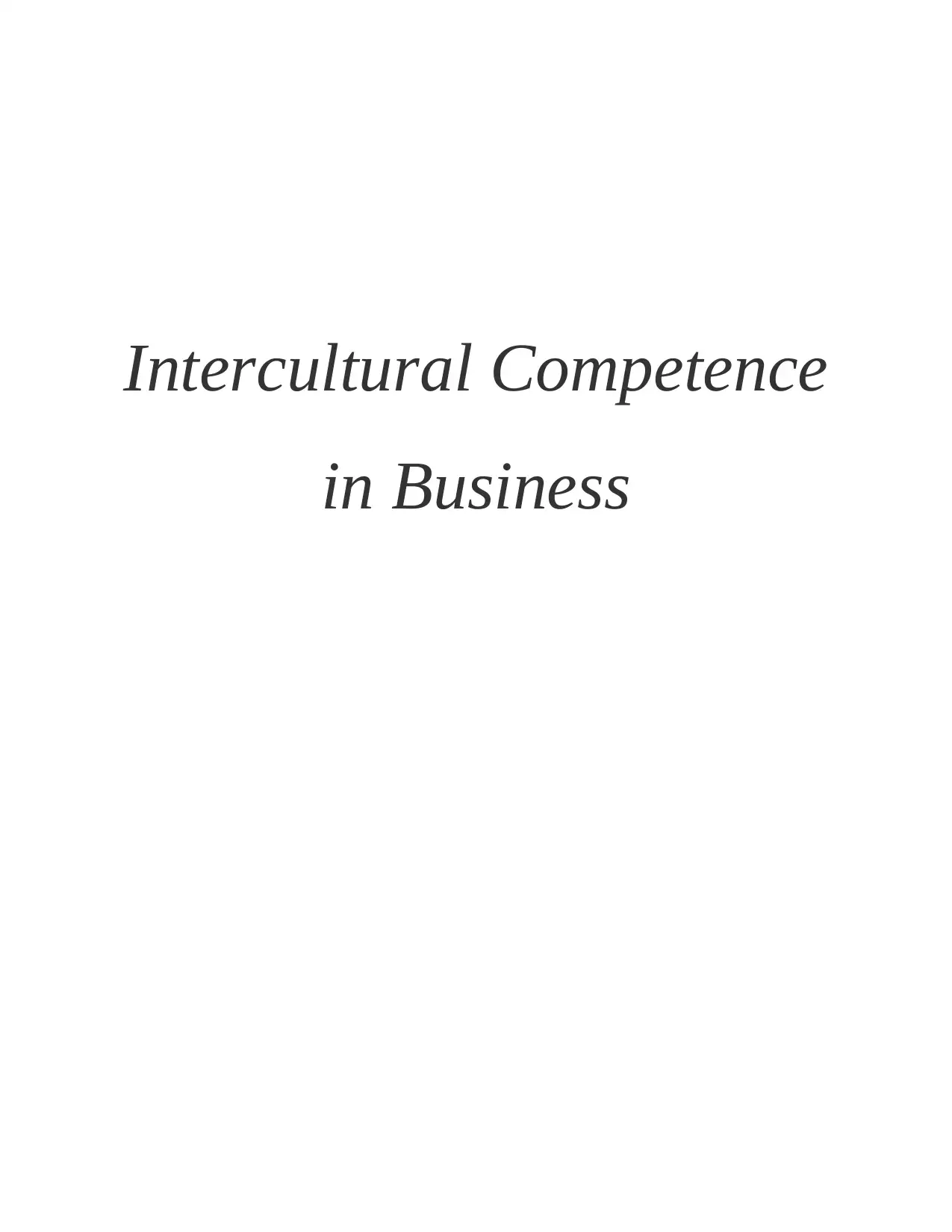
Intercultural Competence
in Business
in Business
Secure Best Marks with AI Grader
Need help grading? Try our AI Grader for instant feedback on your assignments.
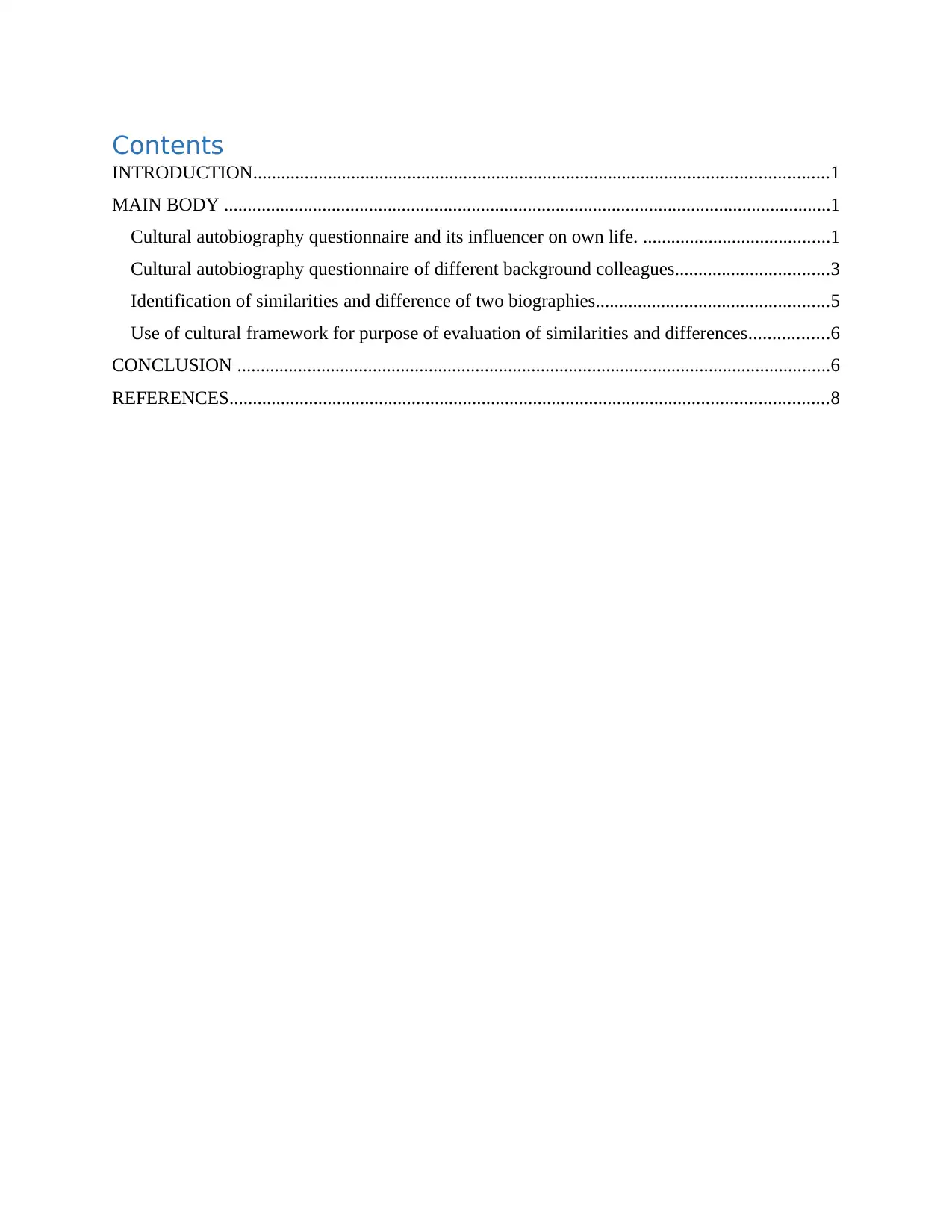
Contents
INTRODUCTION...........................................................................................................................1
MAIN BODY ..................................................................................................................................1
Cultural autobiography questionnaire and its influencer on own life. ........................................1
Cultural autobiography questionnaire of different background colleagues.................................3
Identification of similarities and difference of two biographies..................................................5
Use of cultural framework for purpose of evaluation of similarities and differences.................6
CONCLUSION ...............................................................................................................................6
REFERENCES................................................................................................................................8
INTRODUCTION...........................................................................................................................1
MAIN BODY ..................................................................................................................................1
Cultural autobiography questionnaire and its influencer on own life. ........................................1
Cultural autobiography questionnaire of different background colleagues.................................3
Identification of similarities and difference of two biographies..................................................5
Use of cultural framework for purpose of evaluation of similarities and differences.................6
CONCLUSION ...............................................................................................................................6
REFERENCES................................................................................................................................8
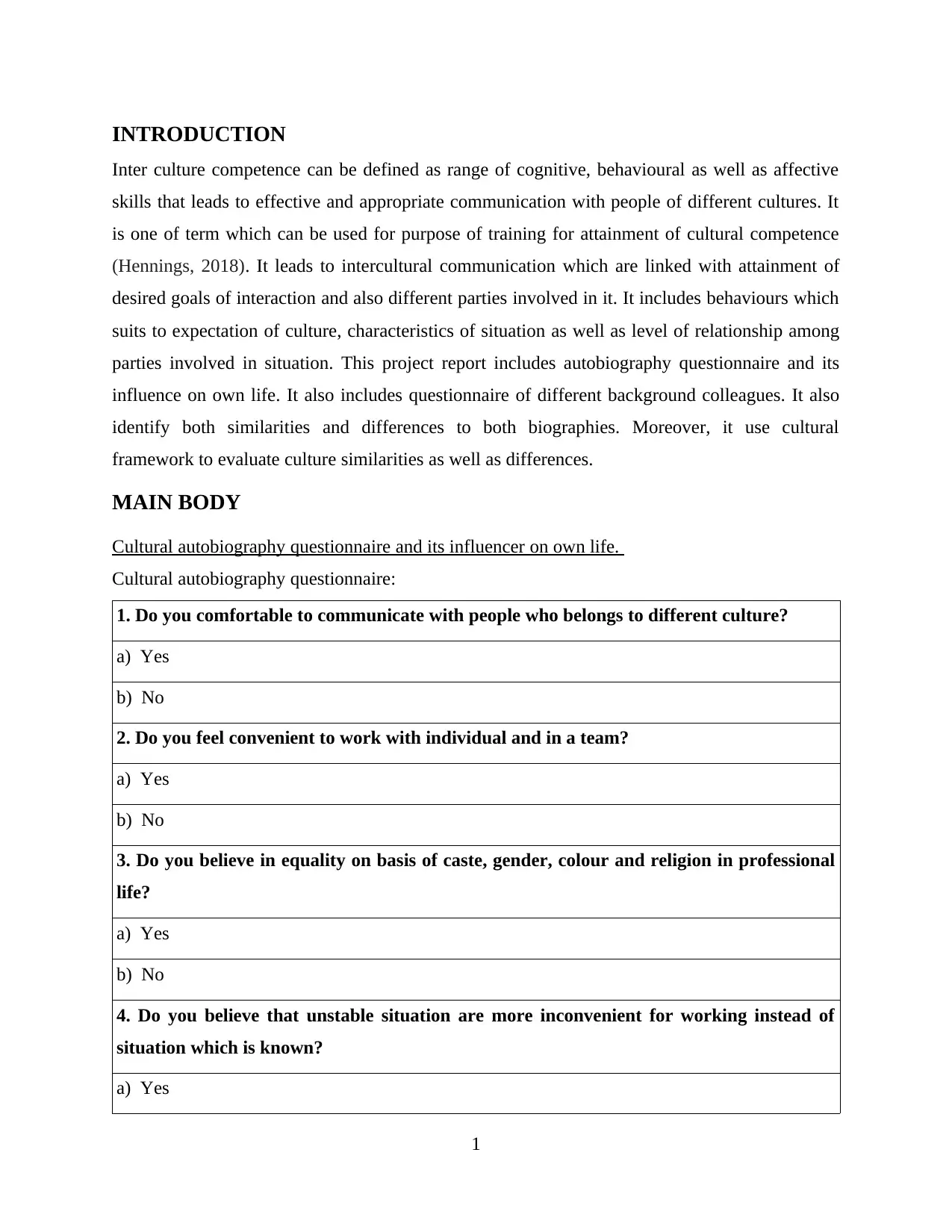
INTRODUCTION
Inter culture competence can be defined as range of cognitive, behavioural as well as affective
skills that leads to effective and appropriate communication with people of different cultures. It
is one of term which can be used for purpose of training for attainment of cultural competence
(Hennings, 2018). It leads to intercultural communication which are linked with attainment of
desired goals of interaction and also different parties involved in it. It includes behaviours which
suits to expectation of culture, characteristics of situation as well as level of relationship among
parties involved in situation. This project report includes autobiography questionnaire and its
influence on own life. It also includes questionnaire of different background colleagues. It also
identify both similarities and differences to both biographies. Moreover, it use cultural
framework to evaluate culture similarities as well as differences.
MAIN BODY
Cultural autobiography questionnaire and its influencer on own life.
Cultural autobiography questionnaire:
1. Do you comfortable to communicate with people who belongs to different culture?
a) Yes
b) No
2. Do you feel convenient to work with individual and in a team?
a) Yes
b) No
3. Do you believe in equality on basis of caste, gender, colour and religion in professional
life?
a) Yes
b) No
4. Do you believe that unstable situation are more inconvenient for working instead of
situation which is known?
a) Yes
1
Inter culture competence can be defined as range of cognitive, behavioural as well as affective
skills that leads to effective and appropriate communication with people of different cultures. It
is one of term which can be used for purpose of training for attainment of cultural competence
(Hennings, 2018). It leads to intercultural communication which are linked with attainment of
desired goals of interaction and also different parties involved in it. It includes behaviours which
suits to expectation of culture, characteristics of situation as well as level of relationship among
parties involved in situation. This project report includes autobiography questionnaire and its
influence on own life. It also includes questionnaire of different background colleagues. It also
identify both similarities and differences to both biographies. Moreover, it use cultural
framework to evaluate culture similarities as well as differences.
MAIN BODY
Cultural autobiography questionnaire and its influencer on own life.
Cultural autobiography questionnaire:
1. Do you comfortable to communicate with people who belongs to different culture?
a) Yes
b) No
2. Do you feel convenient to work with individual and in a team?
a) Yes
b) No
3. Do you believe in equality on basis of caste, gender, colour and religion in professional
life?
a) Yes
b) No
4. Do you believe that unstable situation are more inconvenient for working instead of
situation which is known?
a) Yes
1
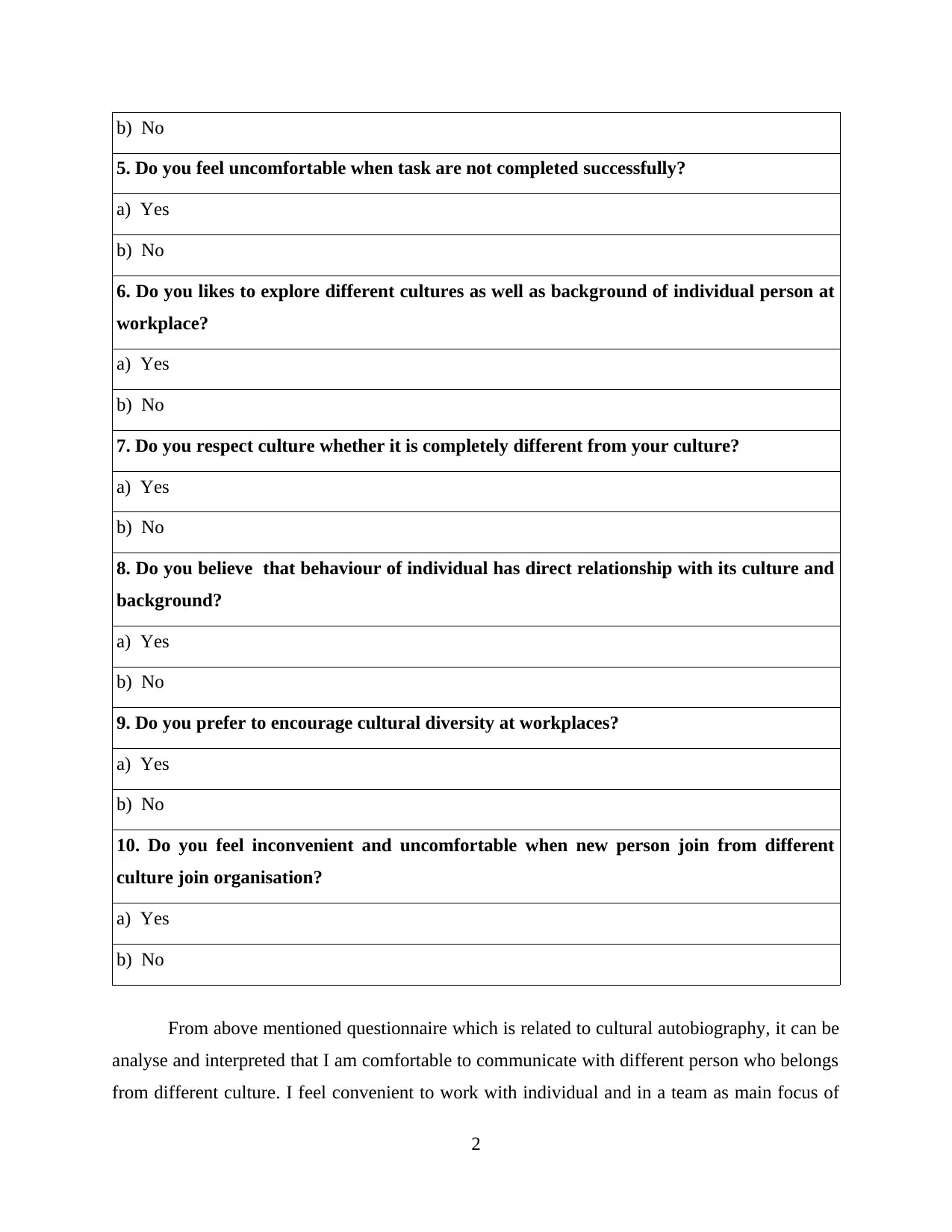
b) No
5. Do you feel uncomfortable when task are not completed successfully?
a) Yes
b) No
6. Do you likes to explore different cultures as well as background of individual person at
workplace?
a) Yes
b) No
7. Do you respect culture whether it is completely different from your culture?
a) Yes
b) No
8. Do you believe that behaviour of individual has direct relationship with its culture and
background?
a) Yes
b) No
9. Do you prefer to encourage cultural diversity at workplaces?
a) Yes
b) No
10. Do you feel inconvenient and uncomfortable when new person join from different
culture join organisation?
a) Yes
b) No
From above mentioned questionnaire which is related to cultural autobiography, it can be
analyse and interpreted that I am comfortable to communicate with different person who belongs
from different culture. I feel convenient to work with individual and in a team as main focus of
2
5. Do you feel uncomfortable when task are not completed successfully?
a) Yes
b) No
6. Do you likes to explore different cultures as well as background of individual person at
workplace?
a) Yes
b) No
7. Do you respect culture whether it is completely different from your culture?
a) Yes
b) No
8. Do you believe that behaviour of individual has direct relationship with its culture and
background?
a) Yes
b) No
9. Do you prefer to encourage cultural diversity at workplaces?
a) Yes
b) No
10. Do you feel inconvenient and uncomfortable when new person join from different
culture join organisation?
a) Yes
b) No
From above mentioned questionnaire which is related to cultural autobiography, it can be
analyse and interpreted that I am comfortable to communicate with different person who belongs
from different culture. I feel convenient to work with individual and in a team as main focus of
2
Secure Best Marks with AI Grader
Need help grading? Try our AI Grader for instant feedback on your assignments.
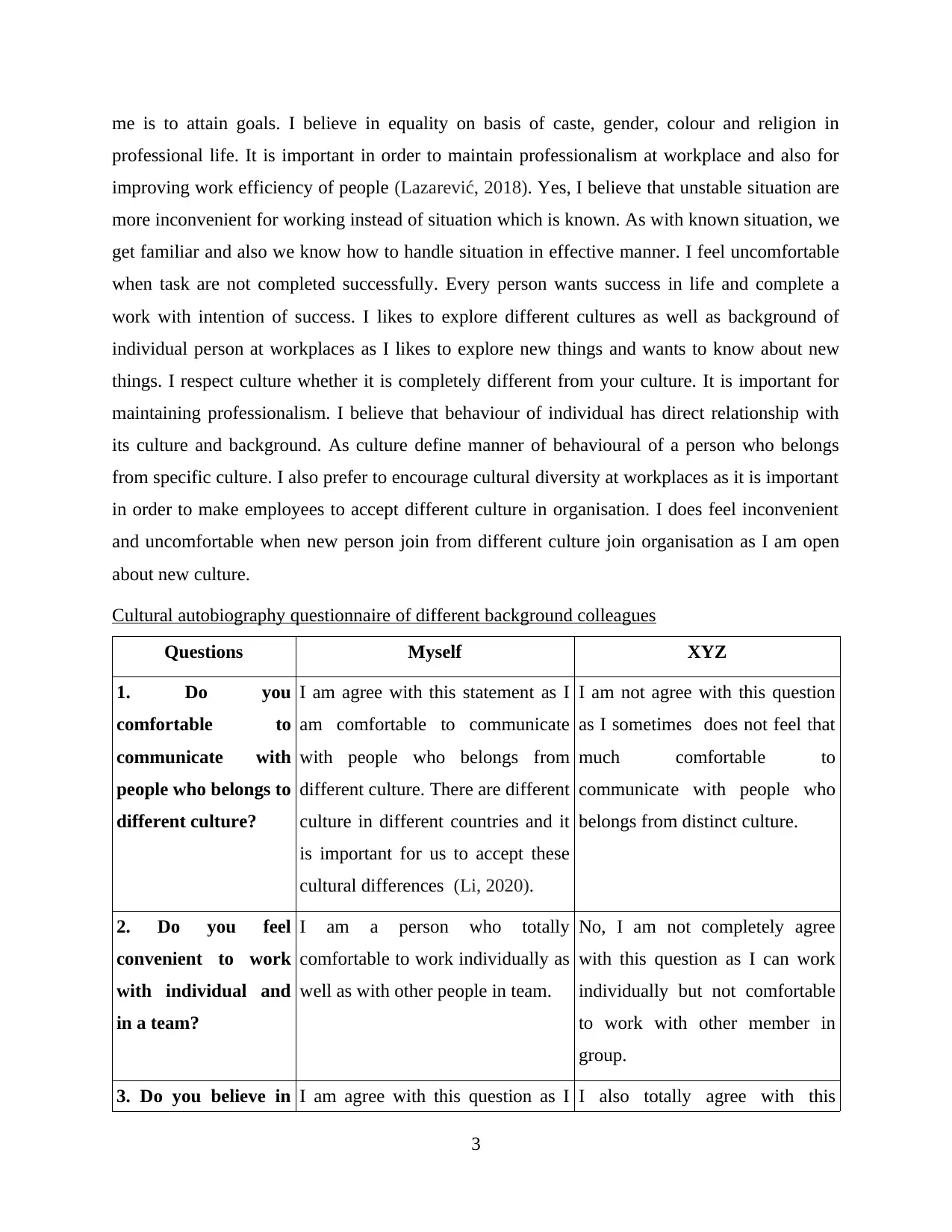
me is to attain goals. I believe in equality on basis of caste, gender, colour and religion in
professional life. It is important in order to maintain professionalism at workplace and also for
improving work efficiency of people (Lazarević, 2018). Yes, I believe that unstable situation are
more inconvenient for working instead of situation which is known. As with known situation, we
get familiar and also we know how to handle situation in effective manner. I feel uncomfortable
when task are not completed successfully. Every person wants success in life and complete a
work with intention of success. I likes to explore different cultures as well as background of
individual person at workplaces as I likes to explore new things and wants to know about new
things. I respect culture whether it is completely different from your culture. It is important for
maintaining professionalism. I believe that behaviour of individual has direct relationship with
its culture and background. As culture define manner of behavioural of a person who belongs
from specific culture. I also prefer to encourage cultural diversity at workplaces as it is important
in order to make employees to accept different culture in organisation. I does feel inconvenient
and uncomfortable when new person join from different culture join organisation as I am open
about new culture.
Cultural autobiography questionnaire of different background colleagues
Questions Myself XYZ
1. Do you
comfortable to
communicate with
people who belongs to
different culture?
I am agree with this statement as I
am comfortable to communicate
with people who belongs from
different culture. There are different
culture in different countries and it
is important for us to accept these
cultural differences (Li, 2020).
I am not agree with this question
as I sometimes does not feel that
much comfortable to
communicate with people who
belongs from distinct culture.
2. Do you feel
convenient to work
with individual and
in a team?
I am a person who totally
comfortable to work individually as
well as with other people in team.
No, I am not completely agree
with this question as I can work
individually but not comfortable
to work with other member in
group.
3. Do you believe in I am agree with this question as I I also totally agree with this
3
professional life. It is important in order to maintain professionalism at workplace and also for
improving work efficiency of people (Lazarević, 2018). Yes, I believe that unstable situation are
more inconvenient for working instead of situation which is known. As with known situation, we
get familiar and also we know how to handle situation in effective manner. I feel uncomfortable
when task are not completed successfully. Every person wants success in life and complete a
work with intention of success. I likes to explore different cultures as well as background of
individual person at workplaces as I likes to explore new things and wants to know about new
things. I respect culture whether it is completely different from your culture. It is important for
maintaining professionalism. I believe that behaviour of individual has direct relationship with
its culture and background. As culture define manner of behavioural of a person who belongs
from specific culture. I also prefer to encourage cultural diversity at workplaces as it is important
in order to make employees to accept different culture in organisation. I does feel inconvenient
and uncomfortable when new person join from different culture join organisation as I am open
about new culture.
Cultural autobiography questionnaire of different background colleagues
Questions Myself XYZ
1. Do you
comfortable to
communicate with
people who belongs to
different culture?
I am agree with this statement as I
am comfortable to communicate
with people who belongs from
different culture. There are different
culture in different countries and it
is important for us to accept these
cultural differences (Li, 2020).
I am not agree with this question
as I sometimes does not feel that
much comfortable to
communicate with people who
belongs from distinct culture.
2. Do you feel
convenient to work
with individual and
in a team?
I am a person who totally
comfortable to work individually as
well as with other people in team.
No, I am not completely agree
with this question as I can work
individually but not comfortable
to work with other member in
group.
3. Do you believe in I am agree with this question as I I also totally agree with this
3
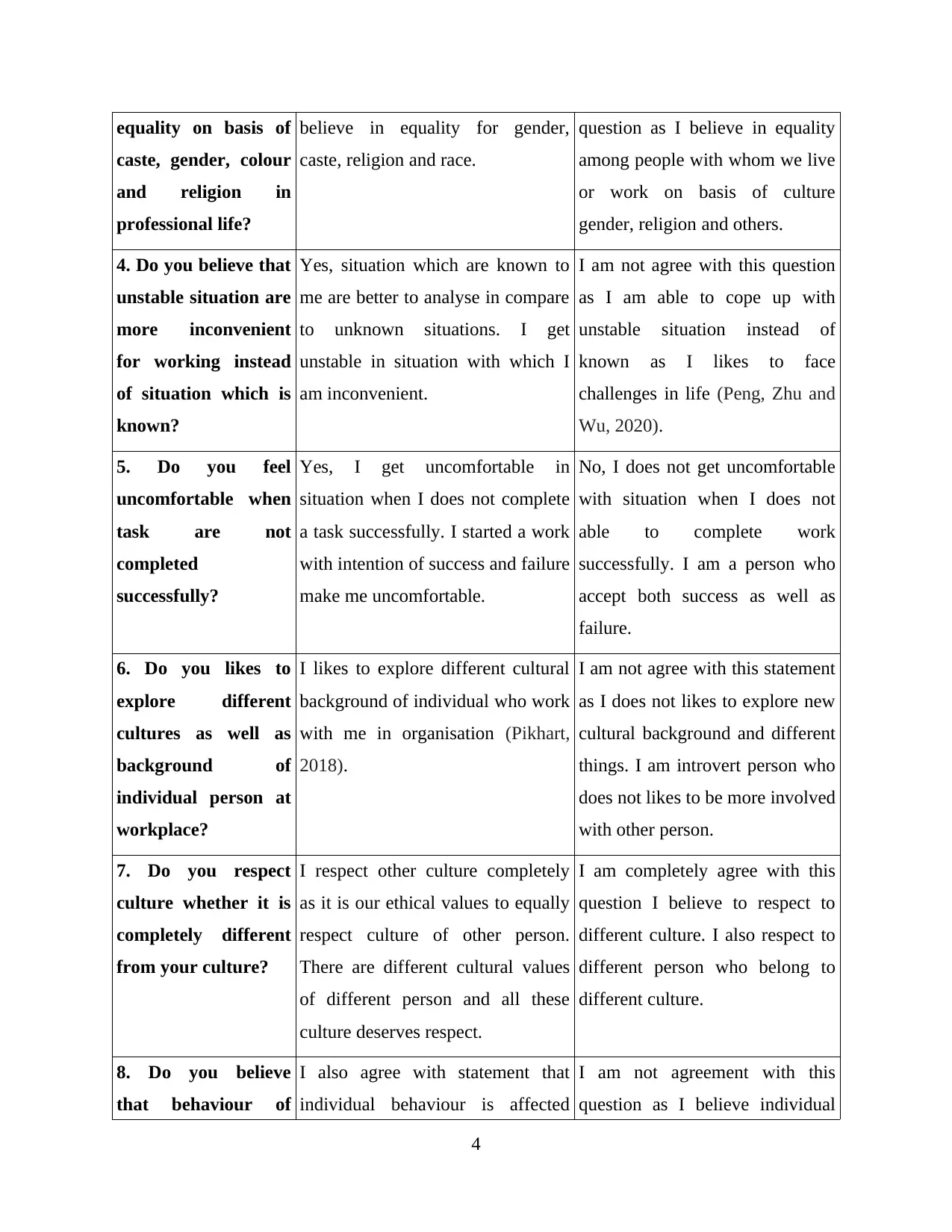
equality on basis of
caste, gender, colour
and religion in
professional life?
believe in equality for gender,
caste, religion and race.
question as I believe in equality
among people with whom we live
or work on basis of culture
gender, religion and others.
4. Do you believe that
unstable situation are
more inconvenient
for working instead
of situation which is
known?
Yes, situation which are known to
me are better to analyse in compare
to unknown situations. I get
unstable in situation with which I
am inconvenient.
I am not agree with this question
as I am able to cope up with
unstable situation instead of
known as I likes to face
challenges in life (Peng, Zhu and
Wu, 2020).
5. Do you feel
uncomfortable when
task are not
completed
successfully?
Yes, I get uncomfortable in
situation when I does not complete
a task successfully. I started a work
with intention of success and failure
make me uncomfortable.
No, I does not get uncomfortable
with situation when I does not
able to complete work
successfully. I am a person who
accept both success as well as
failure.
6. Do you likes to
explore different
cultures as well as
background of
individual person at
workplace?
I likes to explore different cultural
background of individual who work
with me in organisation (Pikhart,
2018).
I am not agree with this statement
as I does not likes to explore new
cultural background and different
things. I am introvert person who
does not likes to be more involved
with other person.
7. Do you respect
culture whether it is
completely different
from your culture?
I respect other culture completely
as it is our ethical values to equally
respect culture of other person.
There are different cultural values
of different person and all these
culture deserves respect.
I am completely agree with this
question I believe to respect to
different culture. I also respect to
different person who belong to
different culture.
8. Do you believe
that behaviour of
I also agree with statement that
individual behaviour is affected
I am not agreement with this
question as I believe individual
4
caste, gender, colour
and religion in
professional life?
believe in equality for gender,
caste, religion and race.
question as I believe in equality
among people with whom we live
or work on basis of culture
gender, religion and others.
4. Do you believe that
unstable situation are
more inconvenient
for working instead
of situation which is
known?
Yes, situation which are known to
me are better to analyse in compare
to unknown situations. I get
unstable in situation with which I
am inconvenient.
I am not agree with this question
as I am able to cope up with
unstable situation instead of
known as I likes to face
challenges in life (Peng, Zhu and
Wu, 2020).
5. Do you feel
uncomfortable when
task are not
completed
successfully?
Yes, I get uncomfortable in
situation when I does not complete
a task successfully. I started a work
with intention of success and failure
make me uncomfortable.
No, I does not get uncomfortable
with situation when I does not
able to complete work
successfully. I am a person who
accept both success as well as
failure.
6. Do you likes to
explore different
cultures as well as
background of
individual person at
workplace?
I likes to explore different cultural
background of individual who work
with me in organisation (Pikhart,
2018).
I am not agree with this statement
as I does not likes to explore new
cultural background and different
things. I am introvert person who
does not likes to be more involved
with other person.
7. Do you respect
culture whether it is
completely different
from your culture?
I respect other culture completely
as it is our ethical values to equally
respect culture of other person.
There are different cultural values
of different person and all these
culture deserves respect.
I am completely agree with this
question I believe to respect to
different culture. I also respect to
different person who belong to
different culture.
8. Do you believe
that behaviour of
I also agree with statement that
individual behaviour is affected
I am not agreement with this
question as I believe individual
4
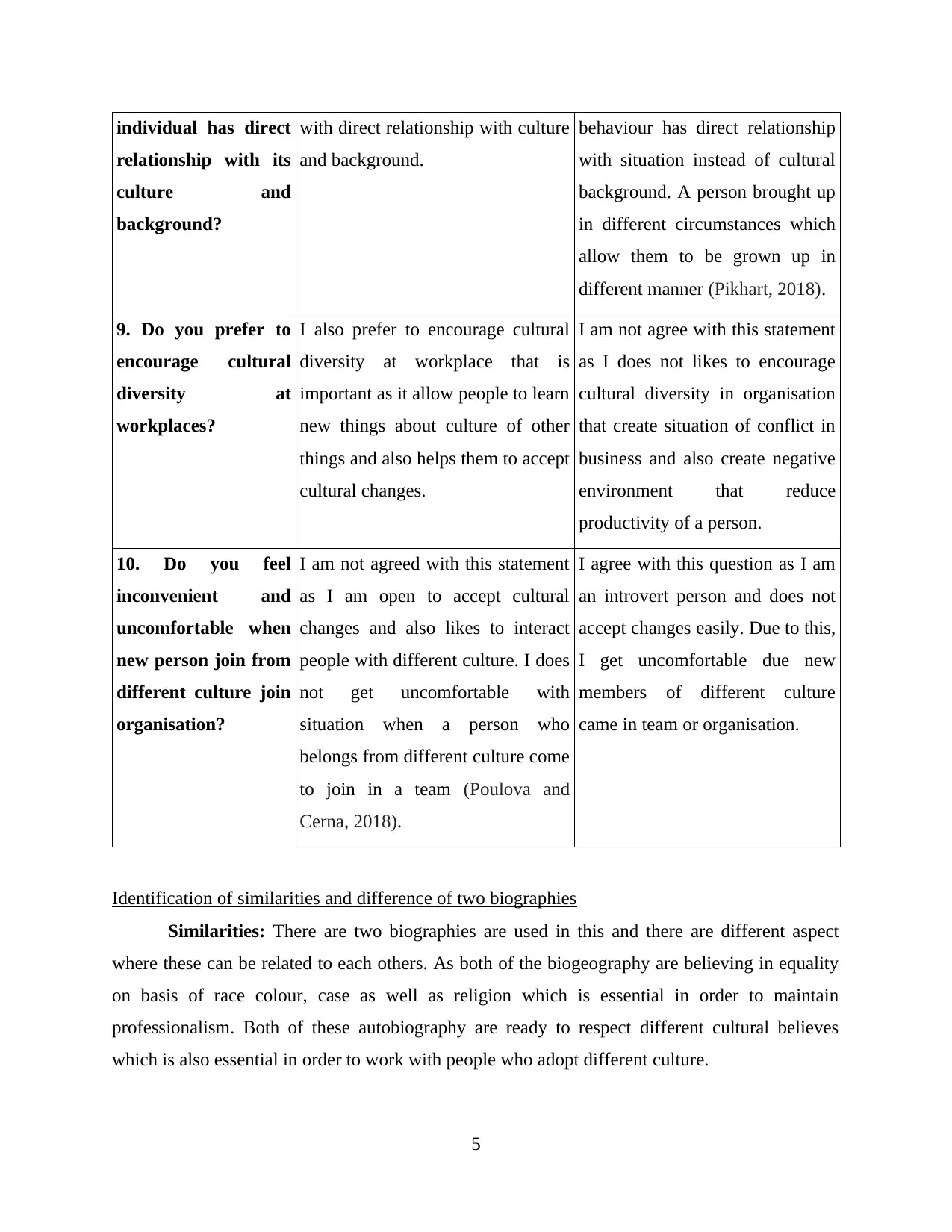
individual has direct
relationship with its
culture and
background?
with direct relationship with culture
and background.
behaviour has direct relationship
with situation instead of cultural
background. A person brought up
in different circumstances which
allow them to be grown up in
different manner (Pikhart, 2018).
9. Do you prefer to
encourage cultural
diversity at
workplaces?
I also prefer to encourage cultural
diversity at workplace that is
important as it allow people to learn
new things about culture of other
things and also helps them to accept
cultural changes.
I am not agree with this statement
as I does not likes to encourage
cultural diversity in organisation
that create situation of conflict in
business and also create negative
environment that reduce
productivity of a person.
10. Do you feel
inconvenient and
uncomfortable when
new person join from
different culture join
organisation?
I am not agreed with this statement
as I am open to accept cultural
changes and also likes to interact
people with different culture. I does
not get uncomfortable with
situation when a person who
belongs from different culture come
to join in a team (Poulova and
Cerna, 2018).
I agree with this question as I am
an introvert person and does not
accept changes easily. Due to this,
I get uncomfortable due new
members of different culture
came in team or organisation.
Identification of similarities and difference of two biographies
Similarities: There are two biographies are used in this and there are different aspect
where these can be related to each others. As both of the biogeography are believing in equality
on basis of race colour, case as well as religion which is essential in order to maintain
professionalism. Both of these autobiography are ready to respect different cultural believes
which is also essential in order to work with people who adopt different culture.
5
relationship with its
culture and
background?
with direct relationship with culture
and background.
behaviour has direct relationship
with situation instead of cultural
background. A person brought up
in different circumstances which
allow them to be grown up in
different manner (Pikhart, 2018).
9. Do you prefer to
encourage cultural
diversity at
workplaces?
I also prefer to encourage cultural
diversity at workplace that is
important as it allow people to learn
new things about culture of other
things and also helps them to accept
cultural changes.
I am not agree with this statement
as I does not likes to encourage
cultural diversity in organisation
that create situation of conflict in
business and also create negative
environment that reduce
productivity of a person.
10. Do you feel
inconvenient and
uncomfortable when
new person join from
different culture join
organisation?
I am not agreed with this statement
as I am open to accept cultural
changes and also likes to interact
people with different culture. I does
not get uncomfortable with
situation when a person who
belongs from different culture come
to join in a team (Poulova and
Cerna, 2018).
I agree with this question as I am
an introvert person and does not
accept changes easily. Due to this,
I get uncomfortable due new
members of different culture
came in team or organisation.
Identification of similarities and difference of two biographies
Similarities: There are two biographies are used in this and there are different aspect
where these can be related to each others. As both of the biogeography are believing in equality
on basis of race colour, case as well as religion which is essential in order to maintain
professionalism. Both of these autobiography are ready to respect different cultural believes
which is also essential in order to work with people who adopt different culture.
5
Paraphrase This Document
Need a fresh take? Get an instant paraphrase of this document with our AI Paraphraser
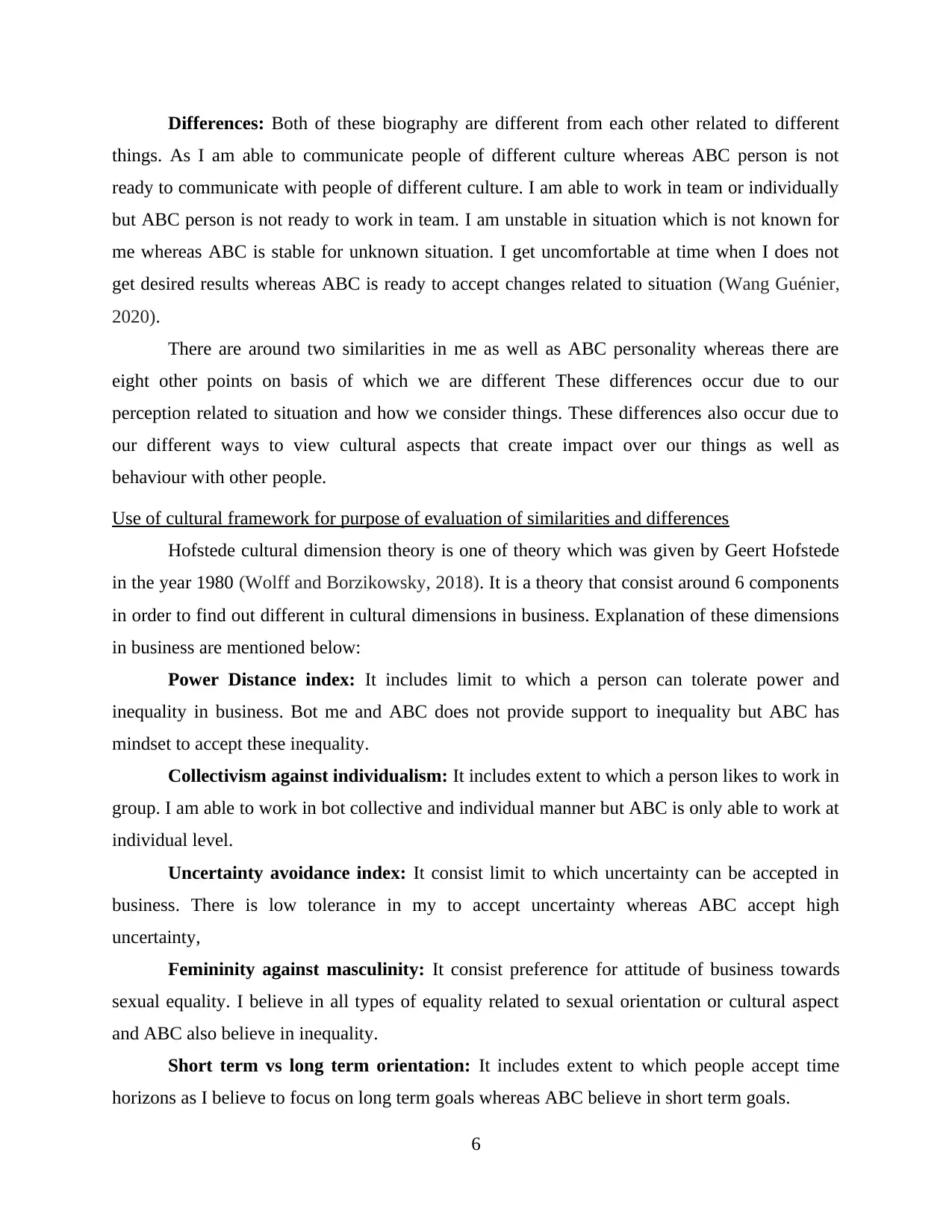
Differences: Both of these biography are different from each other related to different
things. As I am able to communicate people of different culture whereas ABC person is not
ready to communicate with people of different culture. I am able to work in team or individually
but ABC person is not ready to work in team. I am unstable in situation which is not known for
me whereas ABC is stable for unknown situation. I get uncomfortable at time when I does not
get desired results whereas ABC is ready to accept changes related to situation (Wang Guénier,
2020).
There are around two similarities in me as well as ABC personality whereas there are
eight other points on basis of which we are different These differences occur due to our
perception related to situation and how we consider things. These differences also occur due to
our different ways to view cultural aspects that create impact over our things as well as
behaviour with other people.
Use of cultural framework for purpose of evaluation of similarities and differences
Hofstede cultural dimension theory is one of theory which was given by Geert Hofstede
in the year 1980 (Wolff and Borzikowsky, 2018). It is a theory that consist around 6 components
in order to find out different in cultural dimensions in business. Explanation of these dimensions
in business are mentioned below:
Power Distance index: It includes limit to which a person can tolerate power and
inequality in business. Bot me and ABC does not provide support to inequality but ABC has
mindset to accept these inequality.
Collectivism against individualism: It includes extent to which a person likes to work in
group. I am able to work in bot collective and individual manner but ABC is only able to work at
individual level.
Uncertainty avoidance index: It consist limit to which uncertainty can be accepted in
business. There is low tolerance in my to accept uncertainty whereas ABC accept high
uncertainty,
Femininity against masculinity: It consist preference for attitude of business towards
sexual equality. I believe in all types of equality related to sexual orientation or cultural aspect
and ABC also believe in inequality.
Short term vs long term orientation: It includes extent to which people accept time
horizons as I believe to focus on long term goals whereas ABC believe in short term goals.
6
things. As I am able to communicate people of different culture whereas ABC person is not
ready to communicate with people of different culture. I am able to work in team or individually
but ABC person is not ready to work in team. I am unstable in situation which is not known for
me whereas ABC is stable for unknown situation. I get uncomfortable at time when I does not
get desired results whereas ABC is ready to accept changes related to situation (Wang Guénier,
2020).
There are around two similarities in me as well as ABC personality whereas there are
eight other points on basis of which we are different These differences occur due to our
perception related to situation and how we consider things. These differences also occur due to
our different ways to view cultural aspects that create impact over our things as well as
behaviour with other people.
Use of cultural framework for purpose of evaluation of similarities and differences
Hofstede cultural dimension theory is one of theory which was given by Geert Hofstede
in the year 1980 (Wolff and Borzikowsky, 2018). It is a theory that consist around 6 components
in order to find out different in cultural dimensions in business. Explanation of these dimensions
in business are mentioned below:
Power Distance index: It includes limit to which a person can tolerate power and
inequality in business. Bot me and ABC does not provide support to inequality but ABC has
mindset to accept these inequality.
Collectivism against individualism: It includes extent to which a person likes to work in
group. I am able to work in bot collective and individual manner but ABC is only able to work at
individual level.
Uncertainty avoidance index: It consist limit to which uncertainty can be accepted in
business. There is low tolerance in my to accept uncertainty whereas ABC accept high
uncertainty,
Femininity against masculinity: It consist preference for attitude of business towards
sexual equality. I believe in all types of equality related to sexual orientation or cultural aspect
and ABC also believe in inequality.
Short term vs long term orientation: It includes extent to which people accept time
horizons as I believe to focus on long term goals whereas ABC believe in short term goals.
6
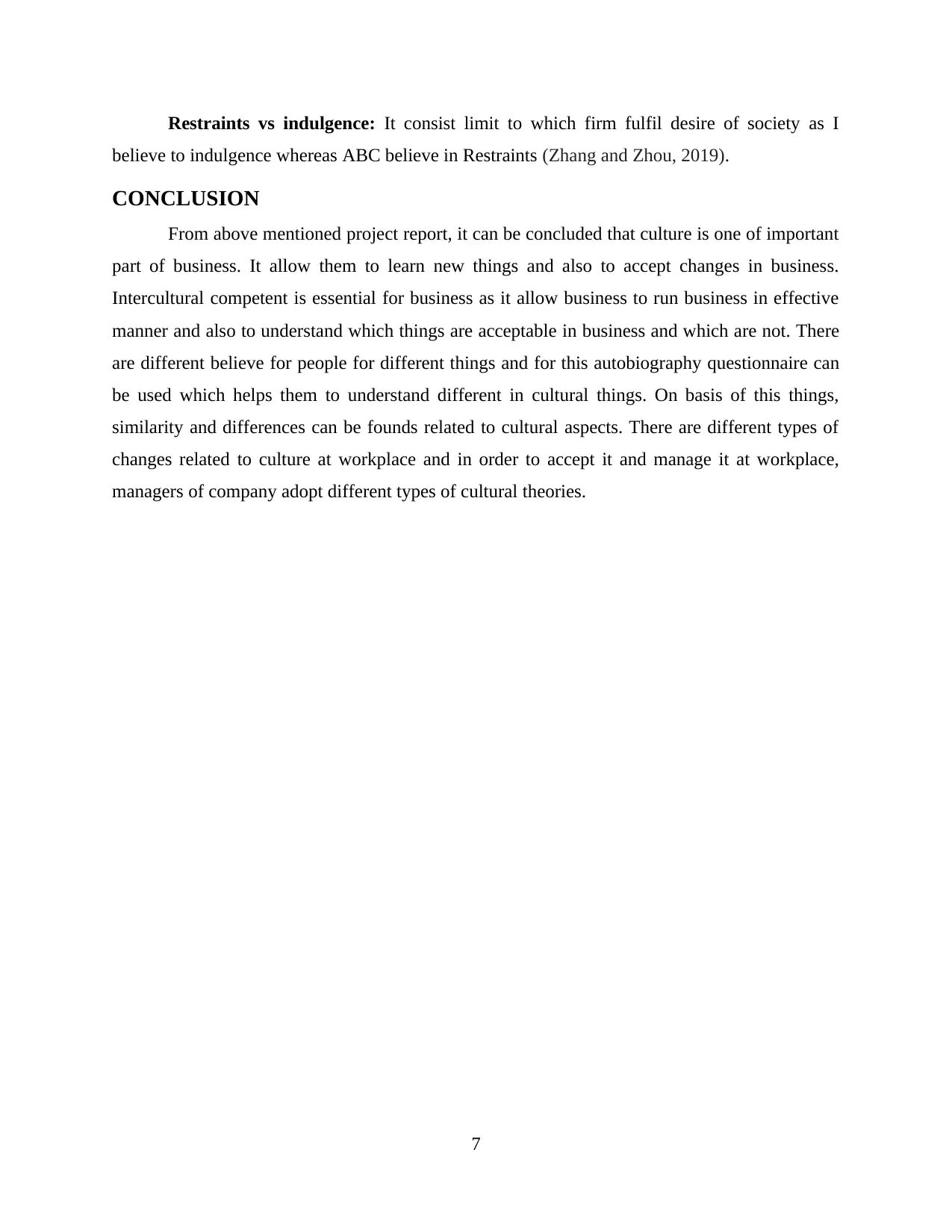
Restraints vs indulgence: It consist limit to which firm fulfil desire of society as I
believe to indulgence whereas ABC believe in Restraints (Zhang and Zhou, 2019).
CONCLUSION
From above mentioned project report, it can be concluded that culture is one of important
part of business. It allow them to learn new things and also to accept changes in business.
Intercultural competent is essential for business as it allow business to run business in effective
manner and also to understand which things are acceptable in business and which are not. There
are different believe for people for different things and for this autobiography questionnaire can
be used which helps them to understand different in cultural things. On basis of this things,
similarity and differences can be founds related to cultural aspects. There are different types of
changes related to culture at workplace and in order to accept it and manage it at workplace,
managers of company adopt different types of cultural theories.
7
believe to indulgence whereas ABC believe in Restraints (Zhang and Zhou, 2019).
CONCLUSION
From above mentioned project report, it can be concluded that culture is one of important
part of business. It allow them to learn new things and also to accept changes in business.
Intercultural competent is essential for business as it allow business to run business in effective
manner and also to understand which things are acceptable in business and which are not. There
are different believe for people for different things and for this autobiography questionnaire can
be used which helps them to understand different in cultural things. On basis of this things,
similarity and differences can be founds related to cultural aspects. There are different types of
changes related to culture at workplace and in order to accept it and manage it at workplace,
managers of company adopt different types of cultural theories.
7
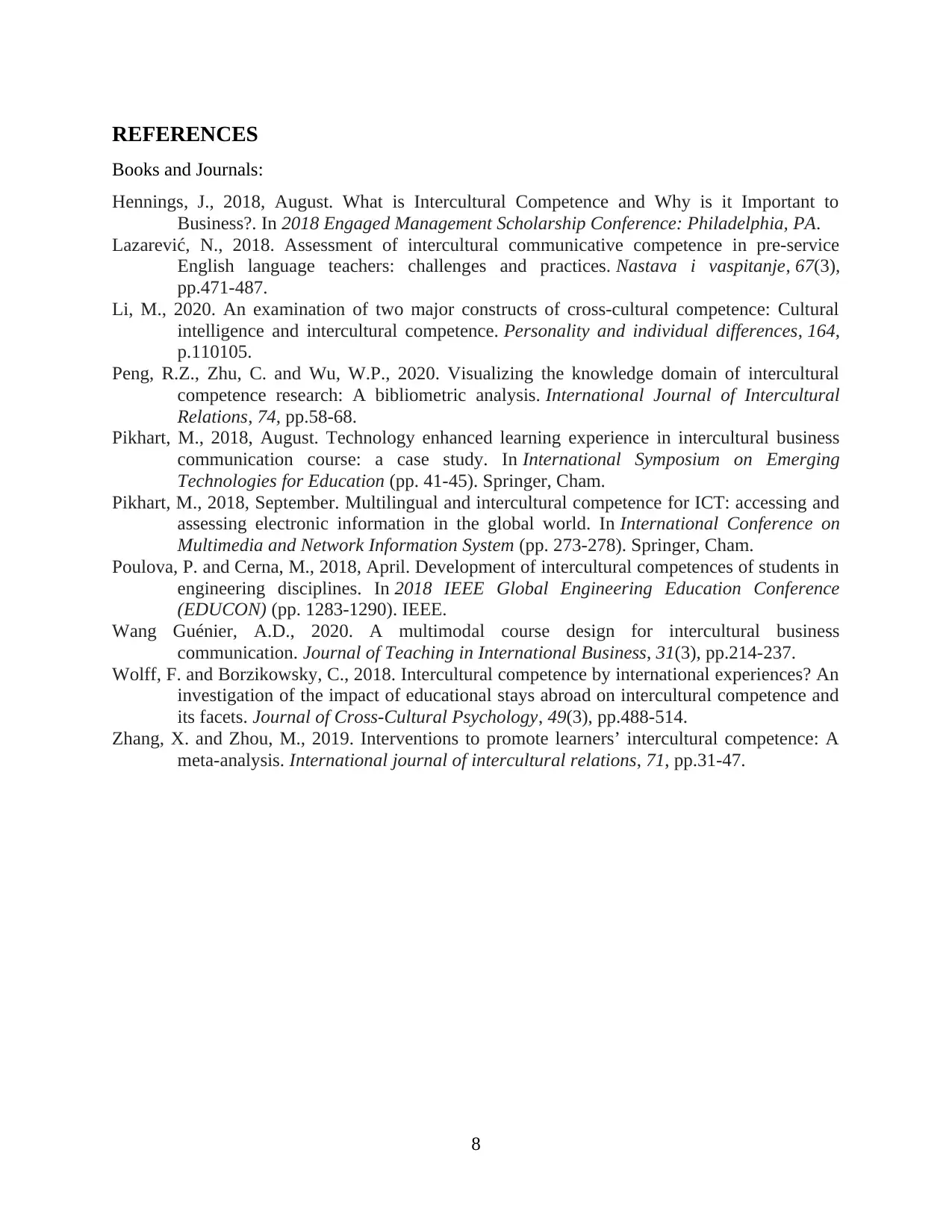
REFERENCES
Books and Journals:
Hennings, J., 2018, August. What is Intercultural Competence and Why is it Important to
Business?. In 2018 Engaged Management Scholarship Conference: Philadelphia, PA.
Lazarević, N., 2018. Assessment of intercultural communicative competence in pre-service
English language teachers: challenges and practices. Nastava i vaspitanje, 67(3),
pp.471-487.
Li, M., 2020. An examination of two major constructs of cross-cultural competence: Cultural
intelligence and intercultural competence. Personality and individual differences, 164,
p.110105.
Peng, R.Z., Zhu, C. and Wu, W.P., 2020. Visualizing the knowledge domain of intercultural
competence research: A bibliometric analysis. International Journal of Intercultural
Relations, 74, pp.58-68.
Pikhart, M., 2018, August. Technology enhanced learning experience in intercultural business
communication course: a case study. In International Symposium on Emerging
Technologies for Education (pp. 41-45). Springer, Cham.
Pikhart, M., 2018, September. Multilingual and intercultural competence for ICT: accessing and
assessing electronic information in the global world. In International Conference on
Multimedia and Network Information System (pp. 273-278). Springer, Cham.
Poulova, P. and Cerna, M., 2018, April. Development of intercultural competences of students in
engineering disciplines. In 2018 IEEE Global Engineering Education Conference
(EDUCON) (pp. 1283-1290). IEEE.
Wang Guénier, A.D., 2020. A multimodal course design for intercultural business
communication. Journal of Teaching in International Business, 31(3), pp.214-237.
Wolff, F. and Borzikowsky, C., 2018. Intercultural competence by international experiences? An
investigation of the impact of educational stays abroad on intercultural competence and
its facets. Journal of Cross-Cultural Psychology, 49(3), pp.488-514.
Zhang, X. and Zhou, M., 2019. Interventions to promote learners’ intercultural competence: A
meta-analysis. International journal of intercultural relations, 71, pp.31-47.
8
Books and Journals:
Hennings, J., 2018, August. What is Intercultural Competence and Why is it Important to
Business?. In 2018 Engaged Management Scholarship Conference: Philadelphia, PA.
Lazarević, N., 2018. Assessment of intercultural communicative competence in pre-service
English language teachers: challenges and practices. Nastava i vaspitanje, 67(3),
pp.471-487.
Li, M., 2020. An examination of two major constructs of cross-cultural competence: Cultural
intelligence and intercultural competence. Personality and individual differences, 164,
p.110105.
Peng, R.Z., Zhu, C. and Wu, W.P., 2020. Visualizing the knowledge domain of intercultural
competence research: A bibliometric analysis. International Journal of Intercultural
Relations, 74, pp.58-68.
Pikhart, M., 2018, August. Technology enhanced learning experience in intercultural business
communication course: a case study. In International Symposium on Emerging
Technologies for Education (pp. 41-45). Springer, Cham.
Pikhart, M., 2018, September. Multilingual and intercultural competence for ICT: accessing and
assessing electronic information in the global world. In International Conference on
Multimedia and Network Information System (pp. 273-278). Springer, Cham.
Poulova, P. and Cerna, M., 2018, April. Development of intercultural competences of students in
engineering disciplines. In 2018 IEEE Global Engineering Education Conference
(EDUCON) (pp. 1283-1290). IEEE.
Wang Guénier, A.D., 2020. A multimodal course design for intercultural business
communication. Journal of Teaching in International Business, 31(3), pp.214-237.
Wolff, F. and Borzikowsky, C., 2018. Intercultural competence by international experiences? An
investigation of the impact of educational stays abroad on intercultural competence and
its facets. Journal of Cross-Cultural Psychology, 49(3), pp.488-514.
Zhang, X. and Zhou, M., 2019. Interventions to promote learners’ intercultural competence: A
meta-analysis. International journal of intercultural relations, 71, pp.31-47.
8
1 out of 10
Your All-in-One AI-Powered Toolkit for Academic Success.
+13062052269
info@desklib.com
Available 24*7 on WhatsApp / Email
![[object Object]](/_next/static/media/star-bottom.7253800d.svg)
Unlock your academic potential
© 2024 | Zucol Services PVT LTD | All rights reserved.




